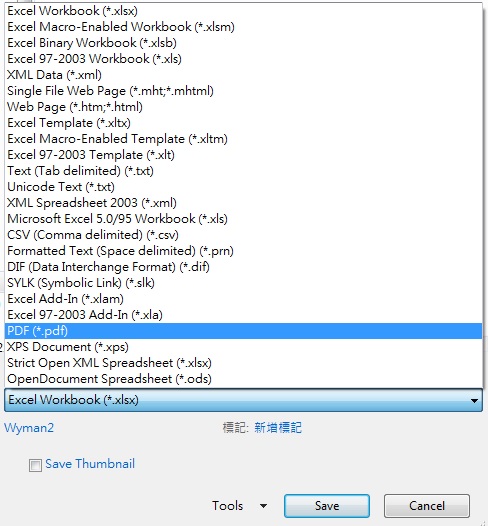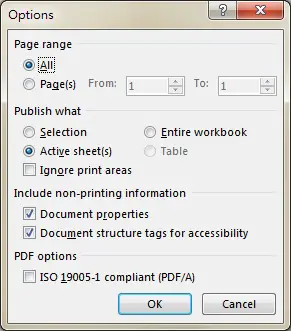This Excel tutorial explains how to export Excel to PDF with and without VBA, how to export all worksheets to one PDF, and export all worksheets to separate PDF.
You may also want to read:
Select multiple worksheets using Excel VBA
How to Convert Excel to PDF (non VBA)
Excel export Excel to PDF (non-VBA)
In Excel, you can easily export Excel to PDF by navigating to File > Save As, in the Save As Type, you can save a file as different file types. Below is the available types in Excel 2013.
Unfortunately there is no option to save each worksheet as separate PDF in any built in options, therefore I create this post to demonstrate how to use VBA to export all worksheets to one PDF, and export all worksheets to separate PDF. If you want to know the detailed steps and what the options means, please refer to my another post- How to convert Excel to PDF.
Excel VBA export Excel to PDF
In VBA, you can export Excel to PDF or XPS using ExportAsFixedFormat Method. This Method can be accessed through Workbook, Sheet, Chart, or Range.
Syntax of ExportAsFixedFormat
ExportAsFixedFormat(Type, Filename, Quality, IncludeDocProperties, IgnorePrintAreas, From, To, OpenAfterPublish, FixedFormatExtClassPtr)
| Name | Required/Optional | Data Type | Description |
| Type | Required | XlFixedFormatType | xlTypePDF or xlTypeXPS. |
| Filename | Optional | Variant | A string that indicates the name of the file to be saved. You can include a full path or Excel 2007 saves the file in the current folder. |
| Quality | Optional | Variant | Can be set to either xlQualityStandard or xlQualityMinimum.Use xlQualityStandard if your file includes picture. |
| IncludeDocProperties | Optional | Variant | Set to True to indicate that document properties should be included or set to False to indicate that they are omitted. |
| IgnorePrintAreas | Optional | Variant | If set to True, ignores any print areas set when publishing. If set to False, will use the print areas set when publishing. |
| From | Optional | Variant | The number of the page at which to start publishing. If this argument is omitted, publishing starts at the beginning. |
| To | Optional | Variant | The number of the last page to publish. If this argument is omitted, publishing ends with the last page |
| OpenAfterPublish | Optional | Variant | If set to True displays file in viewer after it is published. If set to False the file is published but not displayed. |
| FixedFormatExtClassPtr | Optional | Variant | Pointer to the FixedFormatExt class. |
Example 1 – export active worksheet to PDF
The below code save the active worksheet to default location. After Macro is run, PDF will automatically open.
Because I have not specified the file path for flexibility purpose, after PDF is generated and opened, choose Save As to check the path of the file saving carefully, it could be in My Document, Desktop or current Workbook folder. (I believe the location could vary depending on versions and situation)
In addition, I prefer to set Print Area manually beforehand to make sure the area I want to print is as expected.
Sub exportPDF() ActiveSheet.ExportAsFixedFormat _ Type:=xlTypePDF, _ Filename:=ActiveSheet.Name & ".pdf", _ Quality:=xlQualityStandard, _ IncludeDocProperties:=True, _ IgnorePrintAreas:=No, _ OpenAfterPublish:=True End Sub
Example 2 – Export workbook / all worksheets to one PDF
Replace ActiveSheet with ActiveWorkbook.
Sub exportPDF2() ActiveWorkbook.ExportAsFixedFormat _ Type:=xlTypePDF, _ Filename:=ActiveWorkbook.Name & ".pdf", _ Quality:=xlQualityStandard, _ IncludeDocProperties:=True, _ IgnorePrintAreas:=No, _ OpenAfterPublish:=True End Sub
Example 3 – Export all worksheets to separate PDF
The below code exports each worksheet to each PDF. The error handler is for preventing error caused by exporting blank worksheet.
Sub exportPDF3() For Each sht In ActiveWorkbook.Sheets On Error GoTo errorhandler sht.ExportAsFixedFormat _ Type:=xlTypePDF, _ Filename:=sht.Name & ".pdf", _ Quality:=xlQualityStandard, _ IncludeDocProperties:=True, _ IgnorePrintAreas:=No, _ OpenAfterPublish:=True Next errorhandler: End Sub
Example 4 – Export specific worksheets to PDF
The below code exports two separate PDF, each of them includes specific worksheets.
Sub exportPDF4()
ActiveWorkbook.Sheets(Array("Sheet1", "Sheet2", "Sheet3", "Sheet5", "Sheet8", "Sheet12")).Select
ActiveSheet.ExportAsFixedFormat _
Type:=xlTypePDF, _
Filename:="FileA.pdf", _
Quality:=xlQualityStandard, _
IncludeDocProperties:=True, _
IgnorePrintAreas:=No, _
OpenAfterPublish:=True
ActiveWorkbook.Sheets(Array("Sheet1", "Sheet2", "Sheet3", "Sheet6", "Sheet9", "Sheet13")).Select
ActiveSheet.ExportAsFixedFormat _
Type:=xlTypePDF, _
Filename:="FileB.pdf", _
Quality:=xlQualityStandard, _
IncludeDocProperties:=True, _
IgnorePrintAreas:=No, _
OpenAfterPublish:=True
End Sub
Outbound References
https://msdn.microsoft.com/en-us/library/bb238907%28v=office.12%29.aspx


